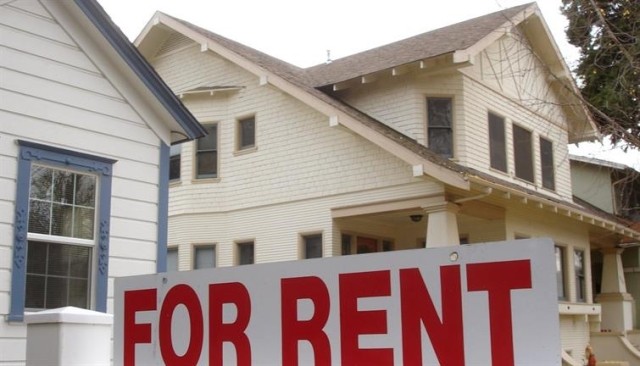2025 Data and Guide on Senior Rentals: What People 55+ Look for in an Apartment
Senior rentals are becoming increasingly popular as adults 55+ look for flexible housing that fits their lifestyle, preferences, and needs. According to the State of the Nation's Housing 2025 report by the Joint Center for Housing Studies of Harvard University, between 2019 and 2023 the number of renter households age 65+ increased by 8.1 percent. In comparison, the age group that saw the second biggest growth was those under age 35 at only 6.4 percent.
To get a better understanding of the senior rental landscape, we surveyed 20,000 individuals in 2025. Of those, 5,066 respondents were aged 55+. We found that 80 percent of the people 55+ surveyed were currently renting. Another 62 percent of the respondents have been searching for a month or longer for a rental, and 64 percent expect to move into a new rental residence within 6 months. Additionally, 65 percent of 55+ renters are currently searching for a new space.
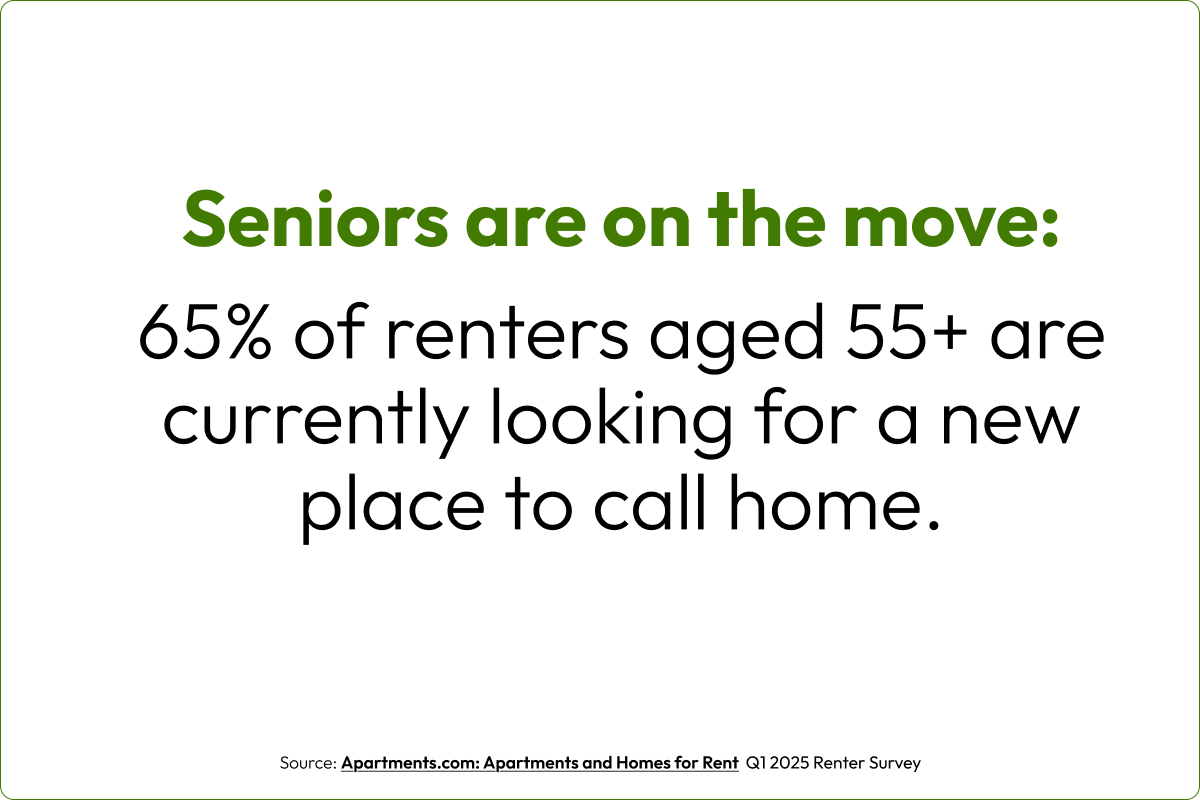
Key Takeaways
- 67 percent of senior renters expect to live in an apartment.
- Renters, aged 55+, cite affordable rent as their reason for moving, 8 percent more than those under 55.
- More than half of senior renters want to live near grocery stores.
- 44 percent of renters aged 55+ plan to move to a different city.
- 71 percent of senior renters are likely to use a rental search app or website.
- Renters aged 55 and older are less likely to sign a lease without seeing the property first, with only 30 percent saying they would do so, compared to 40% of renters under 55.
- Senior renters are 12 percent more likely to use government resources compared to renters younger than 55.
Benefits of Renting as a Senior
Renting means a simpler and less stressful lifestyle for seniors. Apartments for seniors are becoming the choice of residence for those 55+ for several reasons:
- High housing costs: The high mortgage rates are becoming a barrier to home ownership for seniors on a fixed income. This is in addition to other rising costs, so many are choosing to rent to save money.
- Desire to downsize: Once their children have moved out, many older adults don’t want the upkeep and cost of a large house.
- Flexibility to move: Many older adults want to be able to move around and not be tied to a single location.
- Less home responsibilities and maintenance: Owning a home requires a lot of energy, time, and money as you have to make any repairs yourself and do preventative maintenance. When renting, all of that is taken care of by the maintenance team of the apartment community, so seniors can focus on living a fulfilling life doing what they love.
- Access to amenities: Many apartment communities offer amenities like fitness centers and community lounges.
- Social and recreational opportunities: Seniors can find a rental near social and recreational opportunities for easier access. Many 55+ communities host events where residents can learn a new skill or simply socialize and chat.
According to our 2025 rental survey, nearly 7 in 10 senior renters expect to live in an apartment while 1 in 5 expect to live in a single-family home, showing that the benefits of renting have many seniors making the move.
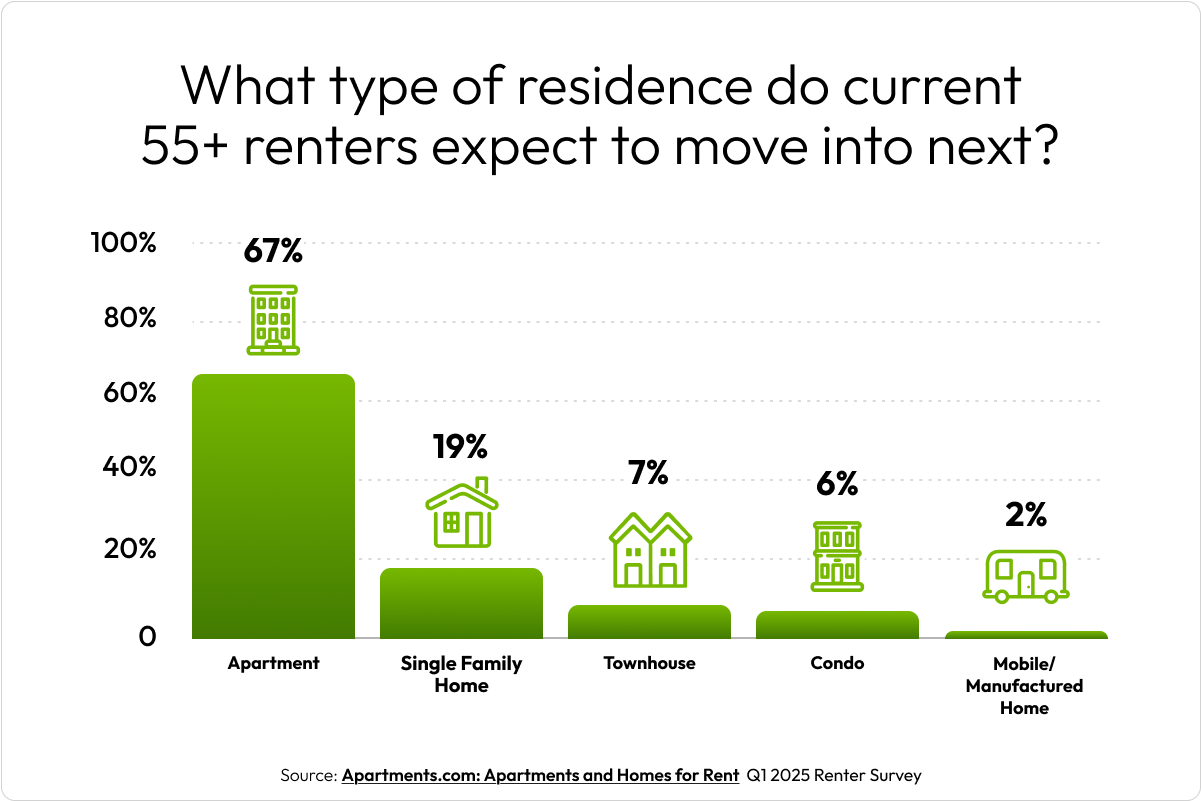
What are the different types of senior housing options?
Every senior has personalized needs when it comes to housing and lifestyle. This is why it is important to pick the type of housing that is right for you. If you decide renting best fits your needs, there are a variety of options, from communities designed for people 55+ to typical rentals.
Be aware that senior-specific housing is popular, so you might have to get on a senior housing wait list. Here are different types of housing to consider.
Regular apartments
These are units within a building managed by a property management company or landlord.
| Best For |
|
|---|---|
| Common Services |
|
| Pros |
|
| Cons |
|
Rental from private landlord
Housing rented directly from an individual owner rather than a management company. Can be apartments, condos, townhomes, or single-family homes.
| Best For |
|
|---|---|
| Common Services |
|
| Pros |
|
| Cons |
|
Senior apartments
Affordable rental housing with age restrictions and optional services.
| Best For |
|
|---|---|
| Common Services |
|
| Pros |
|
| Cons |
|
Independent living
Communities for older adults offering maintenance-free living and social activities.
| Best For | Active, healthy older adults who want maintenance free living. |
|---|---|
| Common Services |
|
| Pros |
|
| Cons |
|
Active adult communities
Age-restricted neighborhoods focused on lifestyle and recreation.
| Best For |
|
|---|---|
| Common Services |
|
| Pros |
|
| Cons |
|
Hurdles you may face as a senior renter
Renting as a senior presents distinct challenges. Whether you are renting a townhouse or decide to live in 55+ apartments, you should be aware of the common hurdles that senior renters face.
Problem: housing affordability
With home prices rising and high mortgage rates, owning a home is becoming more expensive. The 2025 State of the Nation’s Housing Report released by the JCHS says that 27.6 percent of homeowners ages 65 and up were cost-burdened. That means that more than a fourth of older homeowners spent 30 percent or more of their income on housing.
Solution: Explore low-income senior housing and affordable apartments to prevent being cost-burdened. While many older adults choose to sell their home and use those profits and savings to pay for their housing, there are other options.
Medicare and Medicaid might assist with paying for 55+ communities that offer medical services, such as a skilled nursing facility or hospice. Or they can help pay for care so you have more money to put towards housing. There are also state and city programs that assist with senior housing costs, such as the Housing Choice Voucher Program, which are administered by Local Public Housing Agencies like NYCHA.
Problem: rent increases
Rent increases are a challenge for any renter, but for seniors on a fixed income, it can be even more of a strain. Apartments.com’s 2025 Renter Survey found that older renters are more likely to cite needing affordable rent as their reason for moving than those under 55 (by 8 percentage points).
Solution: Handle senior housing rent increases by negotiating with the property manager or landlord. Do market research so you know what a fair price is, as well as if your state or city has any laws or regulations regarding rent increases. Bring that information to the table during negotiations so you can have a productive discussion.
If your rent is raised, you may consider moving out to find a place that fits your budget. However, if you feel your rent has been increased unfairly or unlawfully, then contact a housing mediation service or lawyer.
Problem: noise
While many apartments have designated quiet hours, they are not always strictly enforced. Seniors might also operate on a different schedule than younger renters, making them want different quiet hours.
Solution: Ask the landlord how strictly quiet hours are enforced when you are touring. You also might want to check out other types of rentals, like single-family homes, that provide more privacy and space for peace and quiet. Or consider renting in a senior apartment community as the quiet hours can be more strictly enforced.
Problem: lack of senior accessibility features
Rentals may lack accessibility and mobility features that seniors might need. These features are often necessary for safety reasons, but they also make day-to-day life easier.
Solution: If you are renting a regular apartment or from a private landlord, inquire about the process of requesting reasonable modifications. These changes usually are at the renter’s expense, but the landlord must allow it per fair housing laws. Reasonable modifications can include grab bars, handrails, ramps, and lever-style door handles.
Investigate senior communities that already have these features designed to assist older adults. These communities usually have these elements built into specific units or all of them. Luckily, it’s easy to find on Apartments.com with filters to find specific amenities, including wheelchair access.
Problem: non-senior focused lifestyle essentials
Some seniors want social activities, which many neighborhoods and apartment communities lack.
Solution: Senior communities fill these gaps with social and recreational opportunities. They also provide easy access to amenities. When you tour these places, inquire about what amenities, events, and services the community has.
For those not renting in a senior community, consider the location before you sign a lease. A nearby senior center or shops and restaurants within walking distance makes it easy to get your fill of fun. Libraries often have senior-specific events as well.
Where Should Seniors Rent?
If you’ve decided to pursue senior rentals, the next step is finding where to rent. A variety of factors will come into play, from the location to nearby amenities. Below are some top factors that seniors should consider when looking for their next rental.
Rent close to your everyday needs
Since some seniors have limited mobility, look for rentals close to important locations. The Apartments.com Renter Survey found that grocery stores were the top location, with 57 percent of renters 55+ wanting to live near one. Medical care and proximity to friends and family were equally as important, with each coming in at 37 percent.
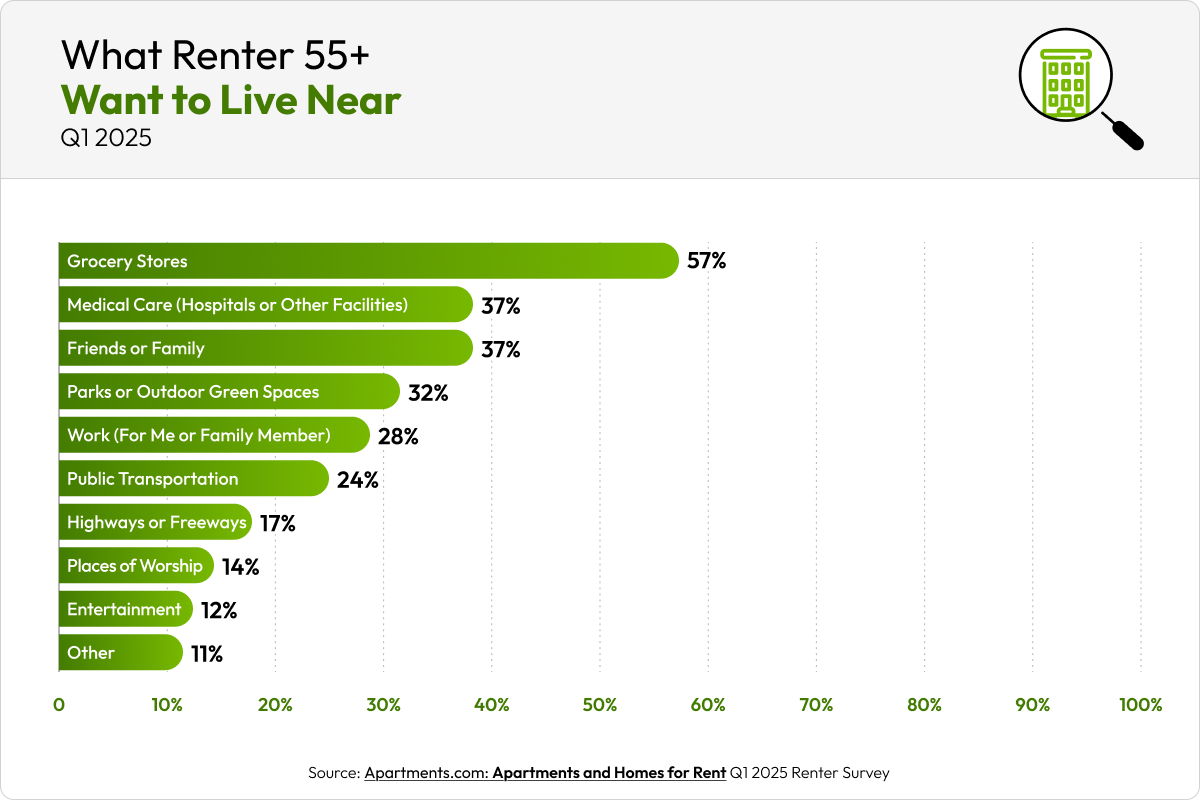
Choose the right climate
The weather and climate heavily influence a senior’s lifestyle. According to the U.S. Census Bureau, warmer areas had the highest net migration rates, meaning that more seniors moved to those areas than left. The South had the largest net migration gain of about 72,900 people per year. The top two states with the highest net migration rates were ones with warm climates: Arizona and Florida.
Seniors looking for good weather year-round want to avoid the complications that come with the snow and cold. These are some of the top places with great weather where seniors retire:
- San Diego, CA
- Cape Coral, FL
- Tucson, AZ
- San Antonio, TX
- Yuma, AZ
Consider a new location
As seniors age, their needs and wants may change, including the city in which they want to live. According to our 2025 Apartments.com Renter Survey, 44 percent of seniors plan to move to a different city.
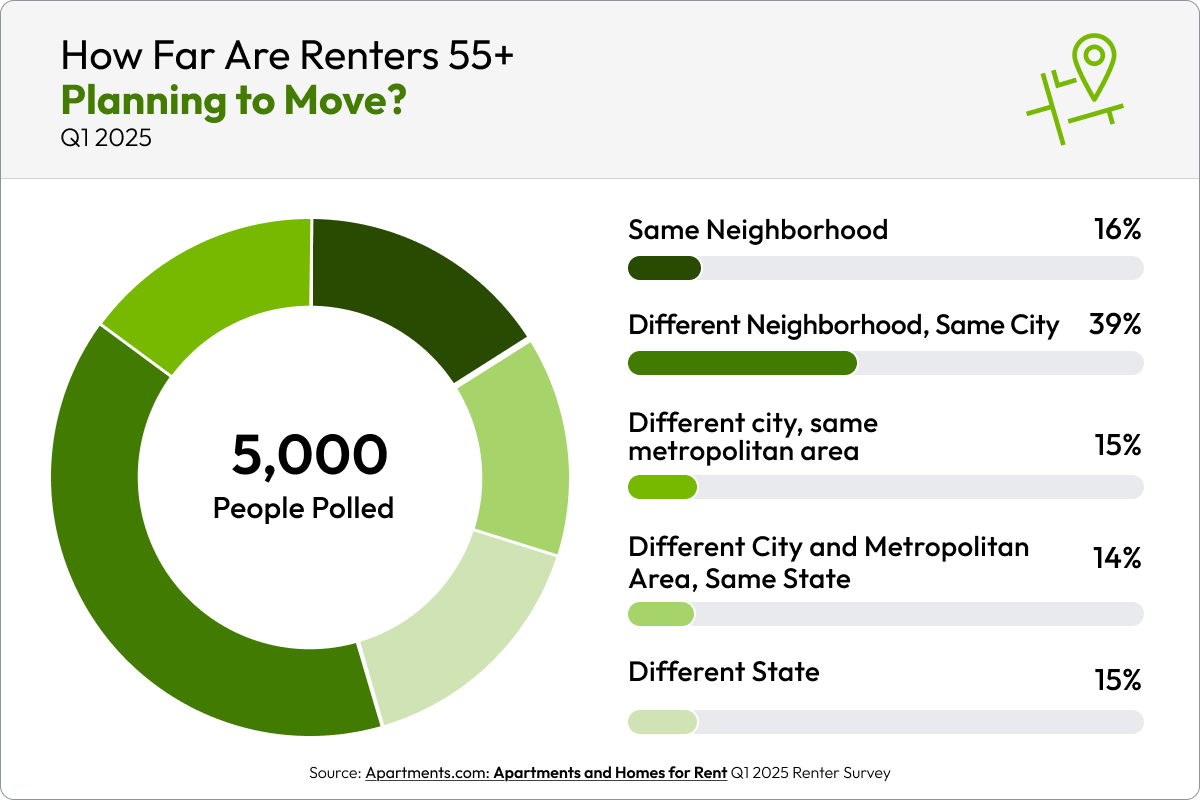
Seniors have a variety of reasons for wanting to move to a different city, but some common reasons include:
- Better weather
- Nearby recreational opportunities
- Downsizing
- Affordability
- Being near friends and family
- Healthcare access
- More senior-focused lifestyle
How Are People 55+ Finding Apartments?
Most older adults, 71 percent, use a rental search app or website to find an apartment. As moving is a strenuous process, most older adults want to see the rental in person before moving. Only 30 percent of renters aged 55+ are likely to sign a lease sight unseen, compared to 40 percent of those under 55.
In-person tours are important, but to narrow down your options, use 3D tours. 3D tours allow you to get a sense for the space and make sure it meets your criteria before you visit.
Government resources are also useful for seniors. Many city and state governments have specific resources to help seniors find housing that is tailored to them. The survey reports that people 55+ are 12 percent more likely to use government resources, like the Housing Authority, compared to younger renters.
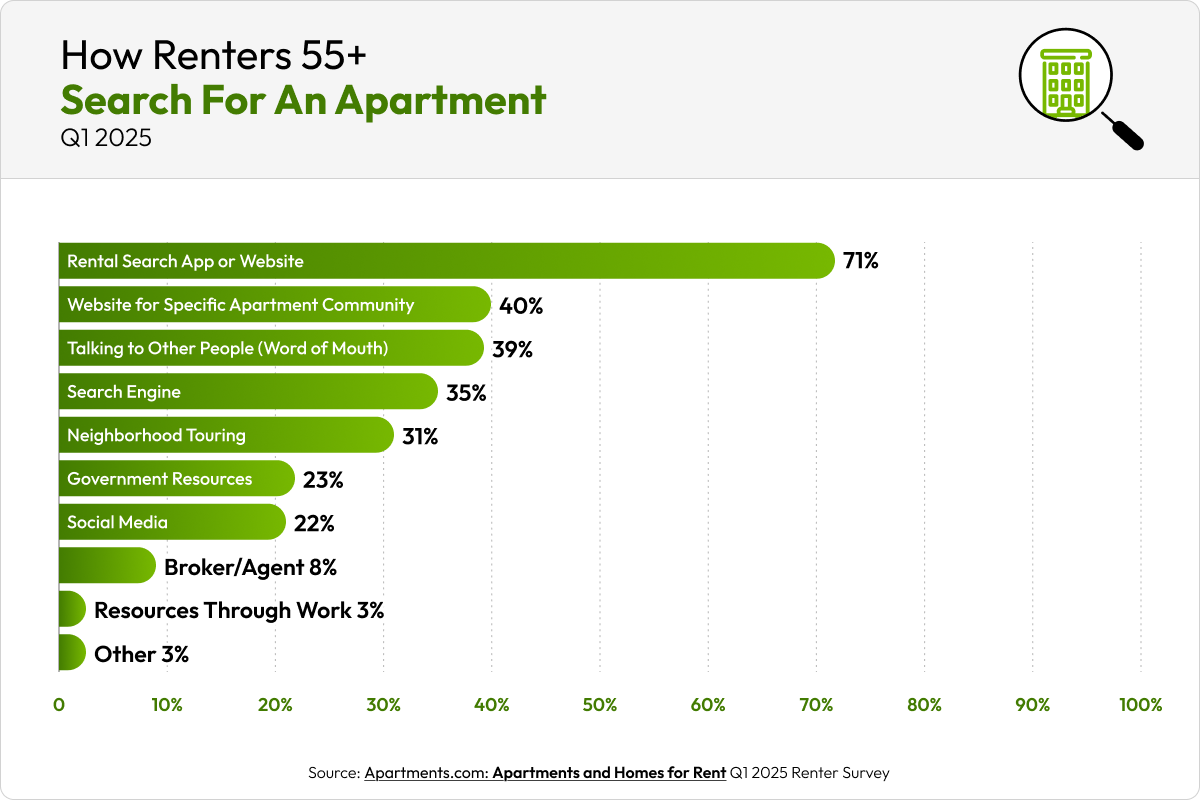
Tips for seniors searching for an apartment
- Decide if you want to live in a regular apartment community, a 55+ community, a private rental home, or a mixed rental community with specific units for seniors.
- Consider the cost to make sure it fits within your budget. In addition to rent, factor in additional costs like utilities, service fees, or move-in fees. Make sure to research how much rent can be raised each year as some cities and states have limits for seniors.
- Use filters on Apartments.com to narrow down the options to only ones that fit your criteria.
- Make a list of your must-haves and wants. This will help you narrow down your options to only communities that meet your parameters.
- Look for accessibility and safety features. Usually this is highlighted in the property description or under features.
- Find communities that are close to important locations, like grocery stores or healthcare facilities.
- Evaluate transportation options, such as public transportation or community-provided shuttles.
- Review what amenities the community offers.
- Read online reviews of the community.
What Questions Should Senior Renters Ask Their Landlord?
While all renters should ask questions, senior renters might be interested in knowing the following:
- Are there any income or eligibility requirements, such as age restrictions?
- What features does the property have?
- What’s the process to install reasonable modifications?
- Are utilities or services included in rent? Are there any additional fees?
- How do you manage emergency maintenance?
- How do I report maintenance issues?
- Are there any quiet hours?
- What is the nearest public transportation?
- What shops, restaurants, or entertainment are near the property?
- Is renters insurance required?
Find Senior Rentals That Meet Your Needs with Apartments.com
Take the next step in your housing journey by exploring senior rentals that enrich and simplify your life. Whether you’re searching for affordability, accessibility, or recreational opportunities, Apartments.com can help you find a senior apartment that has it all.
Senior rentals are easy to find on Apartments.com thanks to the housing type filter. Once in the filter menu, under “Specialty Housing,” select the dropdown menu for “Housing Type.” Then select “Senior” to narrow down the search results to those in that category. Find the perfect place and start living the next chapter of your life!
Methodology
The survey of 20,000 adults ages 18 and over, with 5,066 respondents aged 55+, was conducted by Apartments.com in January 2025.
Senior Rental FAQs
What is the average rent for seniors?
The average rent for seniors is $4,000/month, according to U.S. News, but it varies depending on the type of senior housing. Typically, the more care received, the higher the price. For example, independent living is usually cheaper because residents take care of their own needs.
How can I find housing for seniors on social security?
Seniors relying on Social Security have several options to find affordable housing. The U.S. Department of Housing and Urban Development (HUD), supports and subsidizes housing with programs like Section 202 Supportive Housing for the Elderly, Section 8 vouchers, and public housing.
When searching for low-income senior housing, keep in mind that the Fair Housing Act protects seniors from discrimination and ensures access to reasonable accommodations, such as modifications for mobility or service animals.
What are the best housing options for seniors?
The best housing options for seniors depend on health, independence, and lifestyle needs, but common choices include regular apartments, senior apartments, private rentals, aging in place at home, independent living communities, assisted living facilities, and nursing homes.




